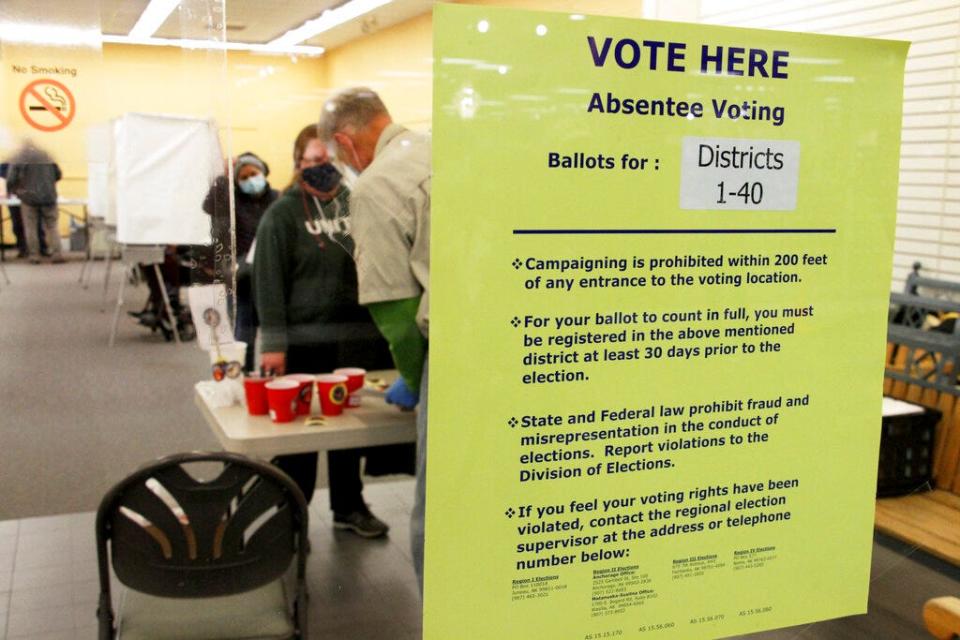Alaska has a long history of Native American voter suppression
EDITOR'S NOTE: This page is part of a comprehensive guide to voting rights across the U.S. and in Puerto Rico.
After the U.S. purchased Alaska from Russia in 1867, a civil government slowly came into being from 1884 as mining activities expanded there. In 1872, gold was discovered near Sitka, and thousands of people settled there during the Klondike Gold Rush.
In 1912, Congress established the Territory of Alaska, with an elected Legislature. Alaska became a state on Jan. 3, 1959. Settlers pre-statehood could vote — but voting rights were conferred initially only to men if they were over 21, an Alaska resident for a year and a U.S. citizen.
Due to an intense suffragette movement in Alaska, the territory granted full voting rights to women in 1913, seven years before the 19th Amendment was ratified in 1920. Alaska Natives and Native Americans were not considered American citizens at the time.
Native American voter suppression
In 1924, Congress passed the Indian Citizenship Act that allowed citizenship for Native Americans. However, in 1925, the Alaska Territorial Legislature passed the Alaska Voters Literacy Act that required voters to speak and read English, automatically excluding non-English-speaking Alaska Natives and Native Americans.
The 1965 Voting Rights Act eliminated poll taxes, literacy tests, and other barriers, and was a step forward for Native Americans, as well as Asian Americans, African Americans and Latinos.
But voter suppression continued in Alaska despite federal laws. For example, in 2011, the Alaska Redistricting Board — an independent body of five members appointed by the governor, Supreme Court justice, and presiding officers of the Senate and the House — merged two southeast Alaska districts, diminishing rural Native voter impact. In 2012, Alaska Native state Sen. Albert Kookesh lost due to this redistricting.
A major federal court judgment in the Toyukak v. Treadwell case in 2014 was a step forward for tribal communities. In 2013, the Native Americans Rights Fund, representing two tribal councils and two Alaska Native voters, filed suit in federal court alleging that state elections officials violated the federal Voting Rights Act and the 14th and 15th amendments of the U.S. Constitution by failing to provide oral language assistance to citizens whose first language is Yup’ik, the primary language of many Alaska Natives in the Dillingham and Wade Hampton regions.
In Alaska, there are 14 census areas that are covered jurisdictions, and each must provide language assistance in at least one Alaska Native language.

As per section 203 of the Voting Rights Act, which was extended in 1975 for covered jurisdictions, election information and materials must also come in the minority languages. In September 2014, the federal court found the state violated the law.
Despite the ruling, bilingual and translation services for tribal members in Alaska were not uniformly provided. In 2019, the U.S. Commission on Civil Rights released a study that showed language assistance and bilingual voting programs were not implemented in full by the state government in the 2016 primary and general elections; to wit, no translated voting materials were available in six of the 19 villages for the primaries.
Other changes since the 2020 election
On June 22, the U.S. Justice Department secured an agreement with Alaska and its officials to ensure that updating of addresses on driver's licenses would sufficiently update voter registration addresses, too.
As per Section 5 of the National Voter Registration Act of 1993, a driver's license application or updating an address on it must simultaneously serve as a voter ID application or update the voter ID, respectively. The Justice Department's investigation found that this was not done consistently in Alaska.
This article originally appeared on Arizona Republic: Alaska voting rights: A history of Native American voter suppression

